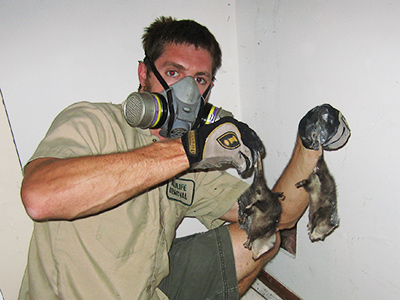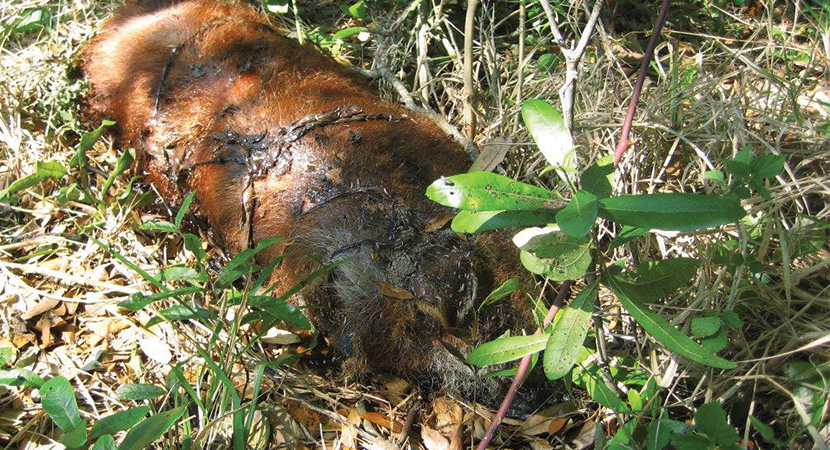Call me: 225-605-9310
Welcome to Baton Rouge Dead Animal Removal! Got a terrible smell in your house, or do you see a dead critter on your property? We are an animal control company specializing in the removal of dead animals from your home, attic, basement, walls, yard, or any part of your property. You clearly don't want a dead animal in your house. Carcasses attract flies and give off terrible smells, not to mention the potential diseases rotting flesh can cause. Whenever we remove dead animals, we use 100% safe methods and make sure to disinfect your home and get rid of all traces of odor. Click here for Free Roadkill Removal and click here for Dead Pet Body Removal. For deceased wild animals in your home or property, call us anytime at 225-605-9310 to schedule an appointment for today! We come out fast! Some of the services we offer include:
- Dead Animal Removal
- Foul Odor Diagnosis
- Full Property Inspections
- House Damage Repairs
- Dead Body Location Services
- Proper Carcass Disposal
- Cleanup & Decontamination Services
- Deodorization Services
CALL US ANYTIME AT 225-605-9310

Would you like to know what makes Baton Rouge Dead Animal the leading name in the Baton Rougearea for wildlife removal? It’s our full and extensive service that guarantees all aspects of the job are tended to. The first thing we’ll need to do is locate the source of the problem: the dead (or alive) animal (s). We use a variety of methods to do this, and can retrieve animals from any hole or crevice in your building, whether it is a business premises, residential home, or other type of property – both inside and out. Following that, our team of technicians will remove the problem, often the carcass, alongside any other potentially contaminated material. This often includes bedding or nesting material, and sometimes extends to drywall and others. In the latter case, our fully-licensed and insured technicians will restore any damage back to its original glory. We know that it’s important to prioritize finding the root of the problem rather than just dealing with the symptoms of the problem. In doing so, we are pleased to offer you a service that is fully-effective, rated five stars by happy former customers, and comes with a full guarantee. To learn more or book one of our friendly and insured technicians, give us a call on 225-605-9310 today. WE can even offer free advice over the phone!
What Prices Do We Charge?
Learn about dead animal removal costs - each situation is different!
What if you found roadkill or a dead animal such as a deer in a public place, and you want the city or East Baton Rouge County services to remove it for free? Click here for Free East Baton Rouge County Dead Animal Removal services. What if a farm animal like a horse, or your beloved pet dog or pet cat has died and you need the body taken away? Click here for Dead Pet Body Removal.
We are experts in dead animal removal, and take our job seriously. When removing dead animals, we do a COMPLETE job — not only do we remove the dead animal from your home or yard, we also decontaminate the area, deodorize it, and dispose of the animal or cremate it. If you aren't sure whether the stench in your house is due to a rotting carcass or another reason, we can sniff it out with our noses from our years of experience. We remove dead raccoons, dead opossums, dead skunks, dead squirrels, dead birds, even dead dogs and cats. We frequently remove dead rodents from inside walls, because poison kills rats and mice, who die in your house. We completely solve your dead animal problem by taking these steps:
- Sniff out the dead animal if it is somewhere in your home
- When necessary, for example if the animal is in a wall or under your house, cut a hole to remove the animal
- Remove the dead animal, safely and completely (and seal the hole if needed)
- Finish the job by decontaminating and deodorizing your home
- Properly dispose of the dead animal through incineration or other means
- Prevent it from happening again by finding out how they got in your house
Dead animal carcass removal is specialty work. Sometimes the job is simple, such as a dead opossum in the yard, in which case we can simply wear our gloves and respirator mask, bag the carcass, and take it away for incineration. Sometimes this is more complex, such as when the dead animal is under a home crawlspace, under a porch or deck or shed. Or if the animal is larger, such as a dog or a deer. The most complex cases are dead animals inside the house. The animal may have died inside the attic, or down in the walls, or the duct work, or any other part of the architecture. You may have a bad smell in your home, and you're not even sure what's causing it. We've removed not just dead animals, but rotting food, bad mold, etc. We specialize in locating the source of the smell, and we very commonly cut a hole in the ceiling or wall to remove the animal. We remove every bit of the carcass, mop up the juices, vacuum the maggots, spray it and wipe it down with disinfectant, cleaner, and we repair the hole we cut. In some cases we use ozone machines to neutralize odor.
Baton Rouge Dead Animal Tip: Why do raccoons die inside houses or attics? How to remove

Raccoons are common household wildlife pests. They infest human environments regularly because they get the required support from these environments. As common household pests, raccoons could die inside houses, especially in attics, the favorite infestation spot of the critters. In this article, we consider why raccoons die inside houses and attics and how the dead critters could be removed. Why raccoons die in houses or attics:
Poisoning
Raccoons are always unwanted guests. The critters could cause significant damage in an area if they are left to thrive. Humans typically seek ways to keep their properties raccoon-free. Although this method is strongly discouraged because of the numerous associated issues, poisoning is still used as a control measure. Poisons targeted at raccoons cause toxic effects and make them die inside a house. Because of the heightened vulnerability, the poisoned critters usually stay close to their nests and die in or around their dens. We should highlight the negative effects of poisoning and why it is discouraged as a pest control measure. Poisoned critters endure significant torture before they die. This is because of the toxicity of the active ingredients. The poisons could also be transferred to other unintended targets.
Sickness
Sick raccoons could die inside houses. Sickness is typically associated with a higher level of vulnerability. The sick critters will prefer to die in the attic where they nest. Sick raccoons are potentially more dangerous. Signs and symptoms of sick raccoons include erratic behavior and bloody feces. The carcasses of the sick raccoons should be removed with the highest level of precaution to prevent the transmission of diseases.
Obstacles
Raccoons could get stuck in attics and die there. When raccoons get stuck, they become very noisy and make scratching sounds. Raccoons could get stuck in the secluded spaces they occupy and die there. The carcasses of such critters could be difficult to remove.
How to remove raccoon carcasses
Raccoons could die in houses or attics and leave carcasses behind for the property owner to deal with. The carcasses of raccoons should be removed from houses or attics because of the dangers they pose. Consider raccoon carcasses as hazardous materials because they can spread diseases. The decomposing carcass will also produce a horrible smell. Raccoon carcasses could be removed by professionals or as a DIY project. Here are tips for the DIY removal of raccoon carcasses.
Follow the smell
The smell of the decomposing carcass will give away its presence. Follow the smell to pinpoint the location of the carcass in the attic. The smell could also lead to the carcasses of critters that died in other spaces. Following the smell could specifically lead to the location of the carcass.
Wear protective clothing
Raccoons are known for the transmission of serious diseases such as rabies. Even the carcasses of the critters could transmit diseases and should be handled with the utmost care. Wear protective clothing like overalls, goggles, masks, and gloves. These materials will protect from direct contact as well as inhalation of hazardous materials.
Dispose of the carcass properly
The efficient disposal of the raccoon carcass is particularly important because of its hazardous nature. Since raccoons carry rabies and other serious diseases, specific regulations will guide the disposal of the carcass. Find out the laws that apply to your locality and dispose of the carcass accordingly.
Clean up the area
The cleanup of the infested area is particularly important when dealing with the potentially infectious raccoon carcass. Hazardous materials could still be generated from the infested area if it is not cleaned. Clean the infested area with a strong solution to destroy all harmful materials. Cleaning the infested area restores the home to the pre-infestation state.
Prevent future infestations
A raccoon died inside the house or attic because it had access. Preventing future infestations will keep a house or attic critter-free. Habitat modification and exclusion measures keep raccoons away from a house. Seal all entry points, and remove all attractants of the critters from the property. Raccoons could die inside homes or attics for different reasons, as highlighted above. Raccoon carcasses are potentially dangerous and should be swiftly and efficiently removed to prevent further negative consequences.
We service nearby towns such as Baton Rouge, Zachary, Central, Baker, Merrydale, Brownfields ,Shenandoah, Inniswold, Westminster, Old Jefferson, Monticello,.